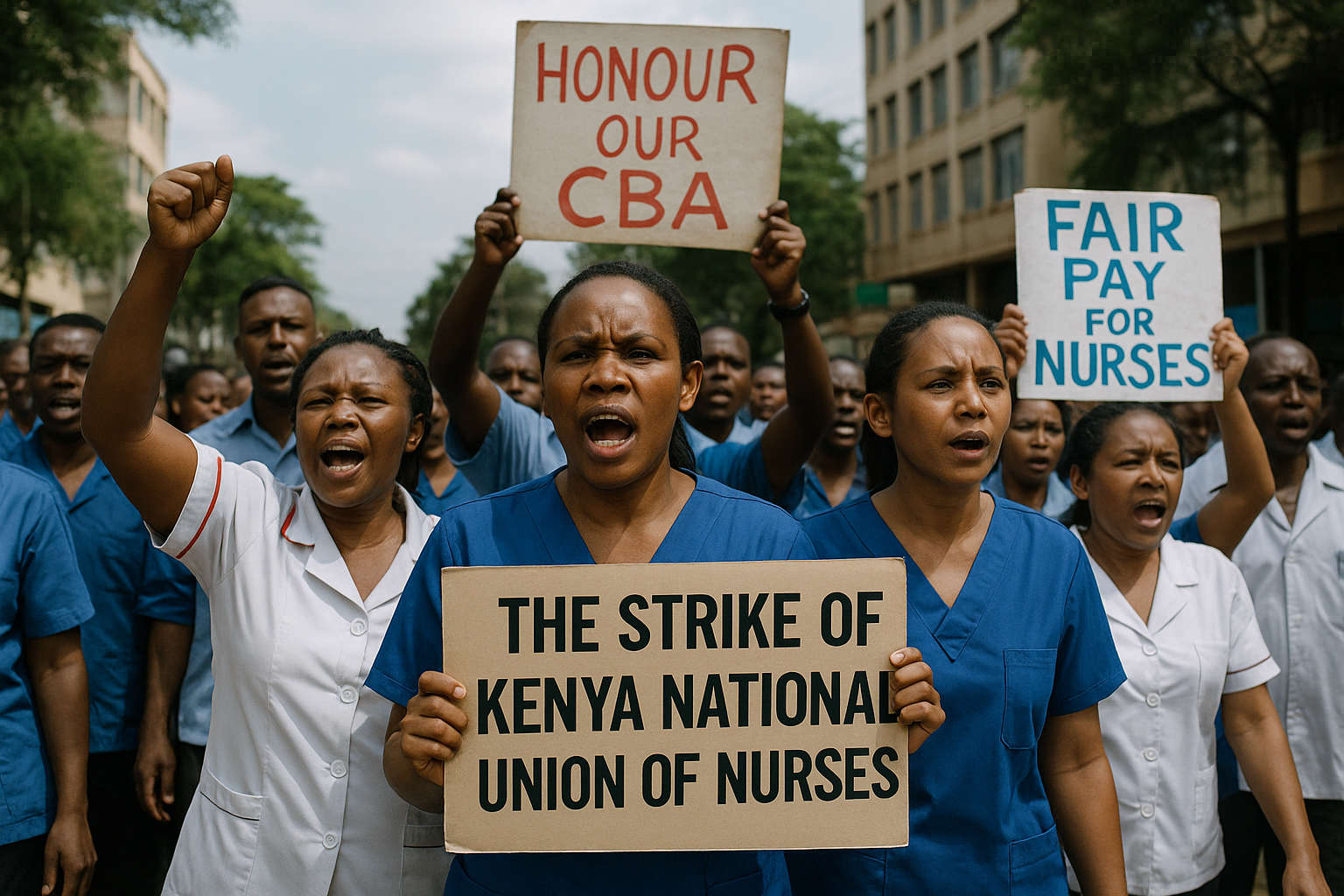Kenya’s fragile healthcare system has once again been thrown into disarray following the announcement of a nationwide strike by the Kenya National Union of Nurses (KNUN). The strike, which began at the end of May 2025, is already crippling operations in public hospitals, with patients being turned away, critical services halted, and emergency care disrupted across counties.
Thank you for reading this post, don't forget to subscribe!Nurses, often described as the backbone of Kenya’s health sector, are protesting over delayed salaries, unpaid allowances, poor working conditions, and the government’s failure to honor previous Collective Bargaining Agreements (CBAs). Their walkout signals deeper systemic issues threatening not only the welfare of frontline health workers but also the health and lives of millions of ordinary Kenyans.
The Roots of the Strike: Broken Promises and Poor Conditions
The strike stems from long-standing grievances, some dating back over a decade. Despite multiple negotiations, signed CBAs, and court rulings, many counties continue to default on their obligations. According to KNUN Secretary-General Seth Panyako, the current strike was “unavoidable” due to the government’s persistent failure to act on agreed-upon terms.
Key issues include:
- Delayed Salaries and Non-Payment of Allowances: In some counties, nurses have gone without salaries for up to three months. Uniform and risk allowances remain unpaid, despite nurses working in high-risk environments, particularly in rural and conflict-affected areas.
- Poor Working Conditions: Many facilities lack basic medical supplies, personal protective equipment (PPE), and reliable infrastructure. Nurses often work long hours without overtime pay.
- Unfair Transfers and Demotions: Arbitrary transfers and demotions have become common, allegedly used by some county governments as punitive tools.
- Failure to Employ More Staff: Despite a massive shortage of healthcare workers, the government has failed to hire more nurses, leading to burnout among existing staff.
Nationwide Impact: Public Health at Risk
The effects of the strike have been immediate and severe. Hospitals across Nairobi, Kisumu, Mombasa, Kakamega, Nakuru, and several other counties are operating at reduced capacity or have shut down key services. Maternity wings, outpatient clinics, and wards have been particularly affected.
In Kisumu County, mothers in labor were turned away from Jaramogi Oginga Odinga Teaching and Referral Hospital due to a shortage of nurses. In Nairobi’s Mama Lucy Hospital, patients waited in line for hours with no assurance of receiving care.
In rural counties such as Turkana, Samburu, and Marsabit—where private hospitals are few and far between—the situation is even more dire, with some patients forced to travel hundreds of kilometers in search of medical attention.
The Kenya Red Cross has raised concerns about a likely spike in preventable deaths if the strike continues, especially among children, expectant mothers, and patients with chronic conditions.
Government Response: Promises and Political Blame Games
The Ministry of Health, through Cabinet Secretary Susan Nakhumicha, has appealed for calm and called on nurses to return to work, stating that negotiations are ongoing and that the government is committed to resolving the impasse.
However, union leaders accuse the ministry of issuing empty promises. They argue that similar reassurances were given during past strikes, yet nothing materialized.
The Council of Governors (CoG) blames the national treasury for delays in disbursing county funds, which has resulted in counties failing to pay nurses. On the other hand, the Treasury claims counties are mismanaging funds and not prioritizing essential services like healthcare.
This political ping-pong has further frustrated nurses and amplified calls for healthcare to be fully managed by the national government rather than devolved to county governments.
Nurses Speak Out: Voices from the Frontline
Nurses participating in the strike have taken to social media and local media stations to share their stories.
One nurse in Bungoma County said:
“We are not asking for luxury—just our basic rights. How can we be expected to save lives when our own lives are crumbling?”
In Kilifi County, another nurse lamented:
“We are working in hospitals without gloves, without medication, and now without salaries. We love our profession, but enough is enough.”
These heartfelt testimonies highlight the emotional and physical toll the current healthcare crisis is having on the workforce that kept the country going through pandemics, epidemics, and natural disasters.
The Public’s Reaction: Sympathy and Frustration
Many Kenyans have expressed sympathy for the nurses’ plight, acknowledging their critical role in healthcare delivery. Hashtags like #SupportNursesKE and #KNUNStrike have been trending, with citizens sharing personal stories of how nurses have impacted their lives.
However, some patients and families caught in the middle of the crisis are voicing frustration. The fear of losing loved ones due to unattended emergencies is growing, and many are calling for urgent government intervention.
Legal Battles and Union Strategy
KNUN has already filed a notice with the Labour Relations Court to legitimize the strike and protect its members from victimization. Legal experts suggest that the union has a strong case, especially considering the evidence of contractual breaches by both the counties and national government.
Seth Panyako has stated that the strike will continue “indefinitely” until all nurses’ demands are met. He has also warned against any attempts by county governments to intimidate or sack striking nurses.
A Way Forward?
Experts and healthcare analysts argue that this strike should be a wake-up call to the government. The repeated failure to prioritize healthcare worker welfare threatens not only current services but also the future of healthcare in Kenya.
Some of the proposed solutions include:
- Immediate salary and allowance payments via a special fund or emergency disbursement from the national treasury.
- Auditing of county health budgets to track spending and prevent diversion of funds.
- Negotiating a centralized healthcare staffing model under national oversight.
- Long-term healthcare reforms that improve recruitment, training, and infrastructure.
Conclusion: A Nation Held Hostage by Healthcare Mismanagement
The Kenya National Union of Nurses strike is not merely a protest—it’s a cry for dignity, justice, and survival in a system that has for too long neglected its most vital human resource. As the nation watches, the question remains: Will the government finally heed the call, or will another crisis pass unresolved, waiting to repeat itself?


